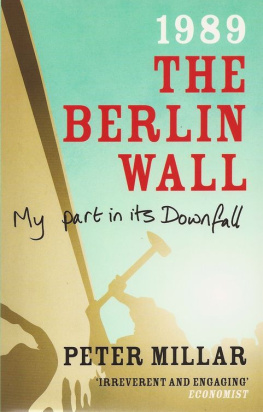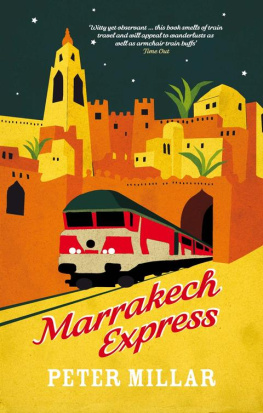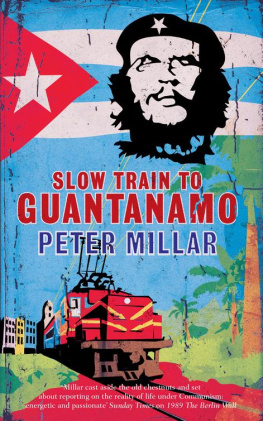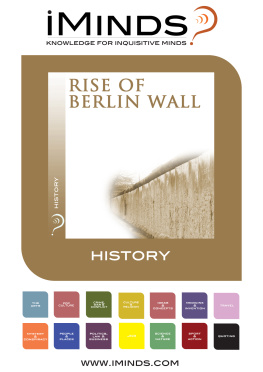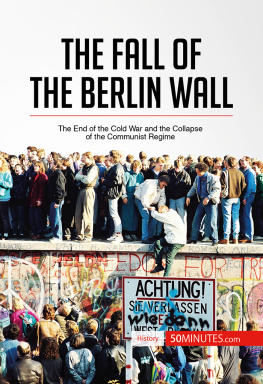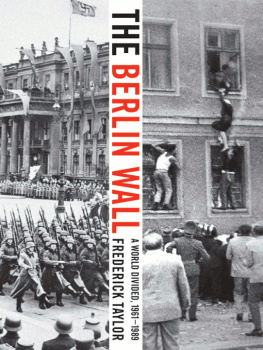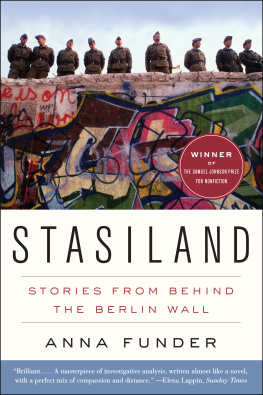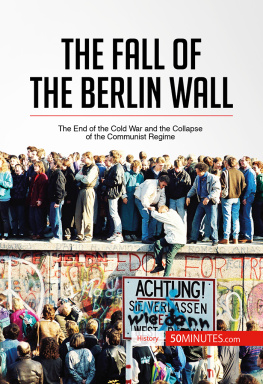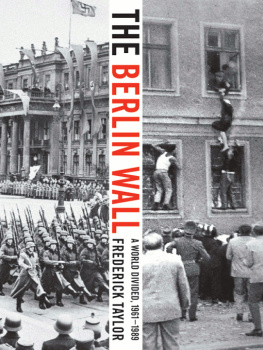Peter Millar - 1989, the Berlin Wall: My Part in its Downfall
Here you can read online Peter Millar - 1989, the Berlin Wall: My Part in its Downfall full text of the book (entire story) in english for free. Download pdf and epub, get meaning, cover and reviews about this ebook. City: London, year: 2009, publisher: Arcadia, genre: Detective and thriller. Description of the work, (preface) as well as reviews are available. Best literature library LitArk.com created for fans of good reading and offers a wide selection of genres:
Romance novel
Science fiction
Adventure
Detective
Science
History
Home and family
Prose
Art
Politics
Computer
Non-fiction
Religion
Business
Children
Humor
Choose a favorite category and find really read worthwhile books. Enjoy immersion in the world of imagination, feel the emotions of the characters or learn something new for yourself, make an fascinating discovery.
- Book:1989, the Berlin Wall: My Part in its Downfall
- Author:
- Publisher:Arcadia
- Genre:
- Year:2009
- City:London
- Rating:4 / 5
- Favourites:Add to favourites
- Your mark:
- 80
- 1
- 2
- 3
- 4
- 5
1989, the Berlin Wall: My Part in its Downfall: summary, description and annotation
We offer to read an annotation, description, summary or preface (depends on what the author of the book "1989, the Berlin Wall: My Part in its Downfall" wrote himself). If you haven't found the necessary information about the book — write in the comments, we will try to find it.
1989, the Berlin Wall: My Part in its Downfall — read online for free the complete book (whole text) full work
Below is the text of the book, divided by pages. System saving the place of the last page read, allows you to conveniently read the book "1989, the Berlin Wall: My Part in its Downfall" online for free, without having to search again every time where you left off. Put a bookmark, and you can go to the page where you finished reading at any time.
Font size:
Interval:
Bookmark:
I have to thank my wife Jackie, who lived through so many of these experiences with me, and put up with my, often prolonged, absence during so many more of them. Also my sons, Patrick and Oscar, who had me dip in and out of their early lives, in particular during the tempestuous year that was 1989. At one stage Patrick, then four, used Budapest as the name of a nook behind the sofa where he hid his toy cars: when things suddenly disappeared they had gone to Budapest.
I also have to thank my great friends from East Berlin, some of them now sadly deceased, in particular the Falkner-Margan family: Brbel, Alex, Alexandra, Horst and Sylvia. And also everyone else who was a regular at the wonderful little East Berlin corner bar, Metzer Eck, during the 1980s. It is still there, run by Sylvie Falkner, substantially unchanged, and remains the best bar in Berlin.
And finally I must acknowledge a huge debt of gratitude to my late mother who throughout that hectic period never failed to cut out her sons clippings from whichever newspaper I was working for at the time, and to preserve them in a scrapbook for me. Her efforts have made the burden on my memory so much lighter.
One thing needs saying before anything else, at least for those unfamiliar with the autobiographical works of Spike Milligan: I make no claim whatsoever to having been instrumental in the fall of the Berlin Wall any more than any other of the millions of people who experienced life behind it and the tremendous exhilaration of seeing its ugly scar removed from the face of a much-loved city. And a tumour excised from the heart of Europe.
From 1981 until 1989 and beyond I was an eyewitness, albeit a highly involved one, to the events that shook the communist Soviet empire to its foundations, eventually toppling it, bringing down the Iron Curtain and leaving the way open for a fresh start in a new century. Like Milligans account of his World War II soldiering in the wonderful Adolf Hitler, My Part in His Downfall, I have tried to take the reader from my own version of square bashing (in the boozers of Fleet Street) to the trenches of the Cold War, where I was, if not exactly a foot soldier, then a front-line reporter.
I am not a comic writer in the vein of the late, great goon, and this is not primarily a funny story, although it does have more than a few comic moments. I have always firmly believed that, to the appreciative eye, history has a sense of humour, even if it is sometimes black humour.
This is not primarily a history book but the story of the curious love-hate relationship between events and journalists, a relationship that ends up as history. It is in particular the story of this journalist and this story is one which I did not so much report as live. East Berlin wasnt just a place I went to write about, but an inseparable part of my life. The people whose lives were forever changed by the events of November 9th, 1989 were not interviewees, but close personal friends, people I considered almost part of my family.
East Berlin was where my wife and I made our first home together as a married couple, a home we had to share with a secretary and a housekeeper, one of them possibly in the employ of the secret police, with microphones in the walls, and men in unmarked cars on our tails as we went about our daily business. It was where we learned the difference between acquaintance and friendship, about the value of freedom and the curious sweet-and-sour taste of life when it is limited, about how the tide of history can all of a sudden sweep over people and places. And how all that really matters is to keep standing when it does. This is a story in which the politicians take a back seat and everyday life springs to the forefront, for even journalists have everyday lives. And the people they meet especially in totalitarian societies are often more interesting than the events they are sent to report on.
In these pages, I have tried to introduce you to some of those people and convey a taste of the lives they led, in many ways so foreign to those of Britons or Americans in the second half of the twentieth century, yet every bit as typical of those decades. Between the affluence of the West and the poverty of the Third World, was a second world, rarely referred to as such. Even those who lived there dared not speak its name: a world of making do, getting by, of living with the shadow of the past, a darkness in the present and little hope for the future. A world that shattered like a glass ceiling in those chaotic days of the autumn of 1989.
I have tried also to answer at least in part one of those questions journalists are so often asked: how do you get the news? And another one that should be asked more often: what do you do with it when you get it? This is a short ride on a rollercoaster of a profession that many people wish they could get into and a good many others wish they could get out of. An insiders look at the [frequent] nuts and [often missing] bolts of the news business, in particular the ups and downs of being a foreign correspondent in the pre-internet days: from shouting, No love, its the Warsaw Pact, not the Walsall Pact, over a crackly phone line to Sunday Times copytakers recently moved from the News of the World, to the joys of punching endless seemingly identical rows of holes in telex tape, of vandalising hotel telephone sockets to fit crocodile clips to bare wires, and standing in phone boxes in the rain with acoustic couplers clamped in an armpit.
The only message of my story is that people make the world. For better or worse. And that accidents happen. All the time.
The fact that the twenty-first century has so far failed to live up to the promise of the end of the twentieth is a depressing reality. All the more reason why we should look back on the events of 1989, the road that led up to them, and savour once again the taste of those moments of euphoria when it seemed the problems of the world were over once and for all.
Because the taste of hope is one none of us dare lose.
Peter Millar, London and Berlin, 2009
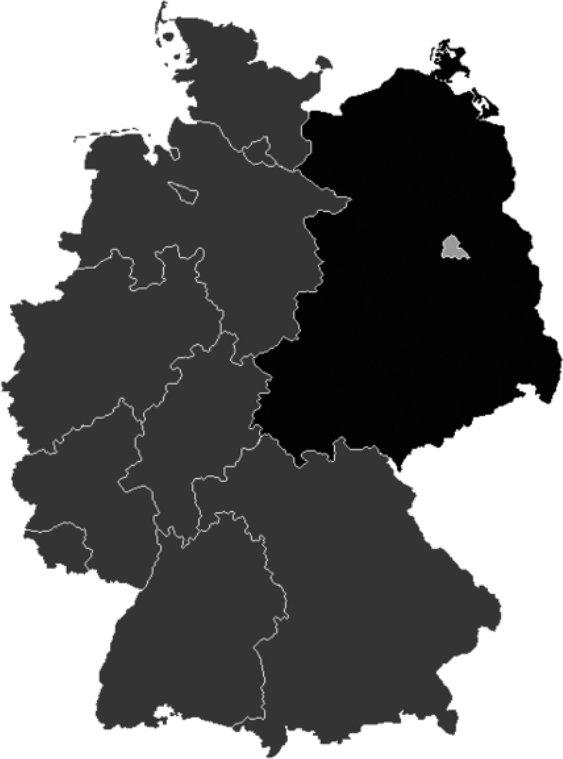
East Germany and West Germany plus the exclave of West Berlin
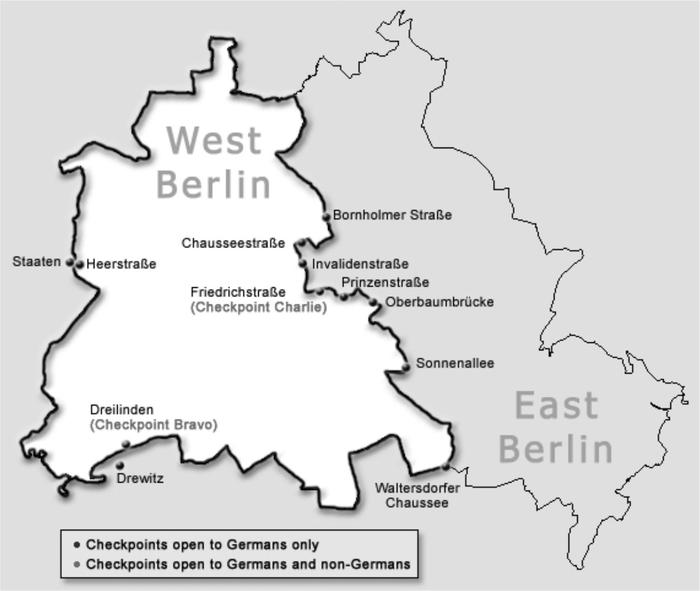
My wife sat at home in floods of tears in front of the television, the uncomprehending toddlers hugging her knees. I was hanging out on a chaotic street corner hundreds of miles away pouring three nineteen-year-old waitresses into a taxi to take them to the biggest party the world had seen in four decades.
My wifes tears were tears of joy. The night was November 9th, 1989, and the Berlin Wall was coming down. For the first time in a century it seemed the whole world was empathising with the Germans. But for me, on that street corner in Berlin in the midst of the biggest story of my career, the predominant thing on my mind as a Sunday newspaper reporter on a Thursday night was: Damn, this is all happening twenty-four hours too early.
But then nobody had known it would happen at all. Least of all the intelligence agencies of the West, caught napping on the eve of their greatest victory, as they would be again on September 11th, 2001, their greatest embarrassment. Not even the men who gave the orders in East Berlin knew it would happen. Not even as they gave them. They had intended something else. Something else entirely. The fall of the Berlin Wall was the triumphant vindication of the cock-up theory of history, of what happens when those seemingly immovable objects of political inertia and the status quo get swept away by two irresistible forces: accident and emotion.
Font size:
Interval:
Bookmark:
Similar books «1989, the Berlin Wall: My Part in its Downfall»
Look at similar books to 1989, the Berlin Wall: My Part in its Downfall. We have selected literature similar in name and meaning in the hope of providing readers with more options to find new, interesting, not yet read works.
Discussion, reviews of the book 1989, the Berlin Wall: My Part in its Downfall and just readers' own opinions. Leave your comments, write what you think about the work, its meaning or the main characters. Specify what exactly you liked and what you didn't like, and why you think so.

